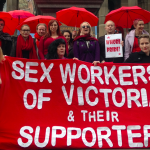Empowering Sex Workers: An Interview with Urban Realist’s Julie Bates

Amnesty International has formally adopted a policy to protect and fulfil the human rights of sex workers. This position includes calling for the decriminalisation of sex work, which they define as “consensual exchanges between adults.”
The starting point of their policy is to prevent and redress the human rights violations perpetrated against sex workers globally, as part of their “commitment to advancing gender equality and women’s rights.” The aim is also to reduce the harms associated with sex work.
In 1995, the Disorderly Houses Development Act was passed through the NSW state parliament, effectively decriminalising sex work in this state. Indeed, NSW and New Zealand are the only jurisdictions in the world to have decriminalised the sex industry.
The reforms improved the health and well-being of sex workers, as well as providing them with greater access to peer support and education. The changes also reduced opportunities for police corruption.
Research shows that decriminalisation didn’t “make the sex industry grow, or become more obtrusive.”
A parliamentary review of the NSW industry last year supported continuing decriminalisation, “as the best way of protecting sex workers and maintaining a more transparent sex work industry.”
The sex worker rights movement
On June 2 1975, hundreds of French sex workers and their allies took over the St Nizier Church in Lyon, as well as occupying other churches around the country, to protest the social and legal inequalities they faced, especially at the hands of police.
The demonstration marked the beginning of the global sex worker rights movement.
Sex workers in Australia began organising in the late 1970s. In response to the HIV/AIDS crisis in the mid-80s, Sydney sex worker advocates became more vocal, which led the Nevada brothel in Kings Cross to become the first in the country to openly take the sexual health of its workers into account and support their need to use condoms.
Last Friday was International Whores Day, which marks the anniversary of the French protest. A group of sex workers gathered outside the World Bar in Kings Cross, which is the property that was formerly home to the Nevada.
Darlo Debby
Long-time sex worker rights activist Julie Bates was one of the organisers of last week’s Whores Day event, which was part of Hidden Sydney.
“It was a wonderful event being welcomed back there to the former Nevada brothel I had once worked at pre-decriminalisation and all that meant ,” Ms Bates said, “to be now standing proud and tall out the front of that majestic old building amongst peers.”
Bates has been at the forefront of the Australian sex worker rights movement since the early 80s. In 1986, following government funding, she was the first in-house manager of the Australian Prostitutes Collective NSW.
Then, around 27 years ago, the collective morphed into the Sex Workers Outreach Project (SWOP), which today is the longest running continually funded peer-based sex worker organisation in the world.
And of course, the word prostitute has fallen into disuse due to its negative connotations.
Harm reduction and fighting for the rights of people who use drugs has also been a key concern for Ms Bates. In 1989, she became the first manager of the NSW Users and AIDS Association, and during this time she worked as a consultant to WHO on supporting countries to develop policies around HIV and sex work.
Sydney Criminal Lawyers® spoke with Julie Bates, principal at Urban Realists, about sex worker mobilisation in Australia, the benefits of decriminalisation and the continued stigma that surrounds the industry.
Firstly, Julie, sex workers in Australia began organising in the late 1970s. By the mid-80s the rights movement was in full swing.
But what was the industry like before sex workers began mobilising? What sort of conditions were workers facing?
Well, you had no say in anything. And in fact, the law criminalised every moment of your life. So you were really incapable of trying to bring about better conditions in your working environment, because you were either being busted by the cops, paying off fines, or turning up in court.
Sex work was deemed a dishonourable profession, and health and welfare services and society treated you accordingly.
The advent of HIV/AIDS was a major impetus for many of the changes that happened to the sex industry.
It was because this was a time where it wasn’t a matter any longer of having recurring STIs and getting a shot in the bum to recover from it. This was something that was going to kill you.
So we really had to stand up and start demanding that clients use condoms. We were coming out of the swinging 60s and free love of the 70s. The only thing that women at that time really wanted to avoid was unwanted pregnancy.
But now, this is an infection that kills. So we really had to start taking some control, otherwise, our lives and our livelihood were in jeopardy. We knew that it’s a sexually transmitted infection, and we needed to do something about it.
There was a groundswell of sex worker rights activities to start trying to get brothel owners – mind you, it was still illegal to run brothels in Sydney – to start taking on board our needs. That is, you help us get condoms on those reluctant male appendages please, and the future success of your business as a safe sex provider is in better shape or words to that effect.
The Nevada was one of the first places that did that?
Yes, the Nevada was the first massage parlour of the day that went public with its promotion of safe sex and condom use. It was important to commemorate International Whores Day at this site in recognition of the role sex workers and the Australian Prostitutes Collective NSW, along with the then owner of the Nevada, played in transforming the NSW sex industry into a safe sex haven and a place where sex worker voices were raised in claiming better conditions and rights.
As a result of the owner acquiescing to our demands to allow condoms on his premises and promote his business as a safe sex establishment, I was the conduit for him getting a double page spread in the Sunday papers.
He risked arrest. He risked all sorts of challenges to his freedom to conduct business – albeit an illegal brothel – by doing that. He was one very brave fellow, but there was no option, the industry had taken a major hit in terms of loss of clients and income, as sex workers were up there with gay men and people who used drugs as presumed vectors of HIV.
However, this brave public stance had the opposite effect, sex workers started to be seen as safe sex educators, other brothel owners adopted a similar safe sex attitude and business started to return.
We at the Prostitutes Collective – well, we called ourselves prostitutes in those days – figured that if you get one of the biggest players in town to do this everybody else will follow suit.
But, we actually became the great safe sex advocates and educators for millions and millions of men throughout the world, because our lives depended on it.
And so it came to pass, in about 18 months – this is backed up by research that was being done by professor Basil Donovan and colleagues at the Sydney Sexual Health Centre – our sexual health did a major turnaround. No longer were we having recurring STIs. And condom use in brothels increased from less than 11 percent of sexual encounters in 1985 to more than 90 percent by 1989. The health of sex workers improved commensurately. Today condom use is close to 100 percent.
We now have better sexual health outcomes, than do our non-sex worker counterparts. And that’s been the case now for the last 30 years.
In 1986, you were employed as the first in-house manager of the Australian Prostitutes Collective NSW, now known as the Sex Workers Outreach Project.
Yes, of which I am a board member these days.
It was the first sex worker advocacy group to receive government funding. What sort of programs and changes did that initiate?
Yes, it was and I think it emboldened other sex worker organisations and groups in Australia at that time, who were also seeking government funding, to up the ante and start demanding that their government likewise fund their work.
And so, it eventually happened where some of the other groups did get government funding and in 1989 following a national conference of sex worker organisations funded by the federal government the previous year, the national sex worker organisation the Scarlet Alliance was formed and part of its charter was to support the development of new and fledgling groups.
Once we received funding we were able to establish a base, set about electing a board, employ staff, expand our outreach activities and develop educational projects including info on safe sex and sexual health, producing a video and a quarterly newsletter with regular visits to street based sex workers and brothels right around the state.
All of this work was grounded in peer based initiatives drawing upon a long established tradition where older and/or more experienced sex workers teach and share skills with newcomers or less experienced colleagues. With the advent of HIV, we formalised this tradition, teaching and encouraging sex workers in all sex work settings to share skills, learn from each other and build confidence in the practical application of safe sex principles and challenge poor working conditions.
This philosophy remains at the heart of our work and, of course, has been continued by SWOP and other sex worker lead groups and organisations around the country.
Basically, it’s sex workers talking to sex workers about the good, the fabulous, the not so good, and sometimes ugly of our work and providing information on a range of topics from law to health to staying safe, making informed choices and information or referrals to other sex worker friendly services. The overarching benefit of peer based organisations and peer support is simply being able to sit down one on one with another sex worker and share lived experiences.
So sex workers have had their rights empowered in the decades since then, and their working conditions have gotten better.
But what are some of the issues that sex workers are still facing in the Australian industry today?
Well, we still face enormous stigma and discrimination and, of course, outside of NSW, punitive legislative responses still exist in all states and territories of Australia criminalizing most aspects of the sex industry.
Many sex workers, for fear of stigma and discrimination and the impact that might have on them and their family, cannot tell anyone what they do for a living. This is a very real fear and plays out in a myriad of harmful ways.
From simply keeping one’s own counsel for fear of prejudice, leaves sex workers isolated and without support and open to challenges to their health and well-being. Not having the opportunity or capacity to share or seek advice and support from peers to actual lived experiences of stigma and discrimination maintains a pattern for an unsatisfactory secret life, leading again to challenges to our health and well-being.
I mean, I’ve reached a time in my life where I do that, because some of those who can, have to do it.
But still, it’s huge stigma and discrimination. In renting properties. In getting loans from the bank. Announcing at your local day care centre that you’re a sex worker.
You keep your own counsel still, because it is too dangerous to do otherwise, which is terrible.
This is the last frontier, if you like, and that is fighting for anti-discrimination protection for sex workers. Anti-discrimination protection goes hand in glove with decriminalisation and for NSW sex workers, it is the last frontier, if you like, for our rights and the rest of the country has a way to go in securing the human, legal and industrial rights for all sex workers.
The global sex worker rights movement, including local sex worker lead organizations, have provided a counterpoint to some of the prejudice and negative attitudes that feed stigma and discrimination, but the work goes on.
Sex work was decriminalised in NSW in 1995. What sort of outcomes did this have for the industry? And how important is it that sex work is decriminalised?
If something is illegal – look at drugs, or any kind of prohibition – there is corruption.
So if you want to get corruption out of the way in the sex industry, and want to ensure that sex workers can go to the police, like anybody else, you need decriminalisation.
If sex workers have been harmed, or they want to make a statement about some kind of crookery enacted upon them, they won’t feel free to do it whilst any aspect of their industry is criminalised. Because, what often happens, if you go in to report a crime against you, they’ll arrest you, or do a warrant check on you, before they treat your case seriously.
If you want to make the world a better, safer place for sex workers, you decriminalise our industry. You recognise it as work like any other, and police are there to help us as well.
So in terms of the harms that criminalisation brings – or end demand programs, like the bullshit Swedish model – they cause great harms to us.
Decriminalisation brings about safety and a bit more respect.
Amnesty International has been pushing for decriminalisation.
Yes, Amnesty International and almost every UN aid organisation has recommended decriminalisation as best practice to ensure our health, safety and well-being.
Last year, we spoke with the Vixen Collective from Melbourne, who were campaigning against the Victorian state government allocating funding to anti-sex work group, Project Respect, who follow the Swedish model that criminalises all sex work.
Are these sort of groups active in NSW? And what sort of impact do groups like this have on sex workers and the industry in general?
It’s not so big in NSW, but then again, we don’t have a Project Respect here. The name being a contradiction in terms, as they are anything but respectful to sex workers unless you are on your knees repenting or in need of a cupcake.
Their true calling is to abolish the sex industry, just like their mates in Sweden, with the bullshit Swedish Model of end demand that maximizes harms to sex workers and their families.
We have occasional little groups of god botherers running around giving out cupcakes in brothels, but not to the extent that it happens in Victoria. This is useless, offensive and patronizing. Sex workers can buy their own bloody cupcakes and personal hygiene products – another seriously offensive gift – as if sex workers are in need of a good wash or something.
Peer based sex worker organisations like Vixen Collective in Victoria and SWOP in NSW visit brothels on an equal footing. That is, they are sex worker peers reaching out to other sex workers providing practical support and leadership in knowing your legal and industrial rights and the importance of maintaining good health, all delivered with pride. And with the underlying message that sex work is work and should be respected as legitimate and valued work like any other human endeavour.
Stack this up against a room full of pearl clutching zealots from Project Respect bearing dubious gifts, and I know who I would let in to my brothel.
People often talk about human trafficking when discussing the Australian sex industry. In your experience, what is the sex trafficking situation like in this country?
I’m not the expert on that, and I suggest you speak to the Migrant Sex Worker Project officer at the Scarlet Alliance.
There’s big inquiries going on at the moment, and many of my colleagues are presenting before that inquiry. But let me tell you, it’s mostly in the imagination and minds of people who have some kind of moral bent against sex work for a start.
I’m not saying that it has never ever happened, and it’s never ever likely to happen again. But the majority of people who are trafficked in this country are trafficked into farms, into sweat shops and forced marriages. And that’s the stuff that’s currently coming out. That’s the most horrendous form of trafficking and slavery we have in Australia.
Sex work really is a very, very small facet of trafficking. It probably falls off the edge of a graph, because it is so minuscule.
So there is a growing number of migrant sex workers coming to Australia to work.
Of course there are. But just like other people, from all walks of life, they are coming to Australia to seek a better life with greater opportunities and less harmful approaches to their work and life.
What sort of issues do these workers face that are specific to them? And are there support networks in place for them?
First of all, when you say migrant, what sort of part of the world do you envisage they are coming from?
From Asia
Well, there you go. Wrong, wrong, wrong.
People are coming from many parts of the world to work in Australia, particularly in NSW, because it has been decriminalised. Because we have free sexual health and related services. Because we have an organisation that respects and cares for people working in the sex industry.
People are not just coming from Asia. Although, when we say Asia, we are Asia. Asia is Australia, so let’s get over ourselves, because people who work in the sex industry, who may have an Asian background, maybe second and third generation Australians.
Yeah sure. But are their support networks in place for people who do come to work from overseas?
Absolutely. One hundred percent. I mean, they don’t just come here on a whim. They come here after having done some research. They say, “Working in my country” – i.e. working in China, for instance – “it’s criminalised. It’s abused. It’s a terrible kind of environment to work as a sex worker.”
So, if you’re making your money from that work, you try to find a better place in the world that’s going to respect you a bit more, and where you’ve got all the services that you need.
The research that’s been done on migrant sex workers – I go back to the Scarlet Alliance – I was part of that research project. I went into the field and interviewed women working in the sex industry that had come from somewhere else – not necessarily Asia, but some had – and that’s what they were telling me.
They were here because they knew that it was a whole lot safer and better. And you could make a whole lot more money too, which is a good thing.
And lastly, today, you’re the principal at Urban Realists: a town planning, health and safety consultancy. Can you tell us about what the work you do involves?
I set up my business Urban Realists some 17 years ago after working for the former South Sydney Council. South Sydney was the first council in NSW to develop policies around their new regulatory role in land use planning for sex services premises (SSP), aka brothels.
It was a pragmatic approach, acknowledging the existence of SSP in their local government area and providing information to SSP owners on how to go about legitimising their businesses through the planning process.
I was employed as the Sex Industry Liaison Officer, to further develop and implement their sex industry policy. After leaving the job and having had the experience, I named my business Urban Realists as a statement on the difficulties faced by applicants in urban planning matters – the name to imply, getting real in urban planning and particularly, how the system was not always kind to proponents in planning applications for sex services premises (SSP), aka brothels.
My work, heading up a specialist planning business, involves taking instructions from clients for the preparation and conduct of a development application and ensuring that the site they have selected meets the principal objectives of the planning controls before signing on the dotted line for rental or purchase of the property.
Basically, if it doesn’t meet the controls it will be refused and the client could lose the deposit on a property or face the expenses and other difficulties of getting out of a lease. So, if the site doesn’t meet the basic essentials of the particular council, it is back to the drawing to source a more appropriate site.
Having said that, save for one or two councils, the majority have developed obstructive and restrictive planning controls that make it near impossible to get consent regardless of whether the site meets the objectives of the overarching controls.
This leaves many applicants with little choice but to launch an expensive appeal at the Land and Environment Court where usually good sense prevails once you take away the emotional moral responses to sex industry development and treat it in a similar manner to other commercial enterprises.
Not what the government had in mind when they decriminalised the industry and handed regulatory control to local councils.
Julie, thanks very much, it was a pleasure speaking with you today.
It’s my pleasure.
And continued success with the advocacy work you carry out on behalf of sex workers.
Thanks very much.
Receive all of our articles weekly
Author

Paul Gregoire






